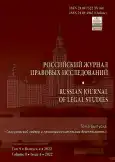Contemporary Problems of Implementation of the Protocol on Northern Ireland after Brexit
- 作者: Galushko D.V.1
-
隶属关系:
- Financial University under the Government of the Russian Federation
- 期: 卷 9, 编号 4 (2022)
- 页面: 115-120
- 栏目: International law
- URL: https://journal-vniispk.ru/2410-7522/article/view/233168
- DOI: https://doi.org/10.17816/RJLS119859
- ID: 233168
如何引用文章
详细
The article analyses some aspects of the practice of implementing the Protocol on Northern Ireland as one of the main elements of the legal formalisation of the UK's withdrawal from the European Union. The problem of Northern Ireland was one of the central issues in the Brexit negotiation process. The found and agreed solution in the form of the Protocol on Northern Ireland initially raised many questions and concerns primarily from the UK’s side, which were later confirmed during the implementation of the document. Immediately after Brexit, the British government took an official position on the need to revise the Protocol as an integral part of the withdrawal agreement, in particular, by initiating a Northern Ireland Protocol Bill, which unilaterally terminates a number of provisions of the Protocol. It is quite natural that such actions on the British side caused indignation of the European Commission, which initiated the appropriate judicial procedure against the UK. An analysis of the process of implementation of the Protocol on Northern Ireland allowed the author to conclude on the negative consequences of the decisions taken by the British government for bilateral relations with the European Union in various fields, as well as the implementation of other provisions of the concluded agreement on trade and cooperation between the two sides. The scientific methods for the underlying research in this article are well-known. The purpose and objectives of the work are to study the relevant problems associated with the implementation of the Protocol on Northern Ireland, the factors contributing to them, as well as the consequences of the decisions taken.
作者简介
Dmitriy Galushko
Financial University under the Government of the Russian Federation
编辑信件的主要联系方式.
Email: galushkodv@gmail.com
ORCID iD: 0000-0002-9301-9565
SPIN 代码: 1710-5918
Scopus 作者 ID: 57219358969
Researcher ID: GLT-7304-2022
Associate Professor, Candidate of Legal Sciences
俄罗斯联邦, Moscow参考
- Doyle J, Connolly E. Brexit and the Future of Northern Ireland. DCU Brexit Institute - Working paper. 2017;1:1–21.
- Ryan B. The Common Travel Area between Britain and Ireland. The Modern Law Review. 2001; 64(6):855–874.
- Keating M. Brexit and the Irish Border. RIPS: Revista De Investigaciones Políticas Y Sociológicas. 2021;20(1):1–17. DOI: https://doi.org/10.15304/rips.20.1.7719
- O’Neill M. Brexit and the Irish border: consequences for the peace process. Rivista Di Studi Politici Internazionali. 2018;85(3(339)): 359–382.
- Hayward K. ‘Flexible and Imaginative’: The EU’s Accommodation of Northern Ireland in the UK–EU Withdrawal Agreement. International Studies. 2021;58(2):201–218.
- Phinnemore D. The United Kingdom: Turning its Back on Influencing the EU? JCMS: Journal of Common Market Studies. 2022:1–24. DOI: https://doi.org/10.1111/jcms.13419
- Galushko DV. Istoriko-pravovye aspekty konflikta v Severnoj Irlandii [Historical and legal aspects of the conflict in Northern Ireland]. Istoriko-pravovye problemy: novyj rakurs. 2018;1:73-80. (In Russ.).
- Hazell R, Renwick A. Brexit: Its Consequences for Devolution and the Union. UCL Constitution Unit Briefing Paper. 2016:1–5.
- Hayward K, Komarova M. The Protocol on Ireland/Northern Ireland: Past, Present, and Future Precariousness. Global Policy. 2022;13 (Suppl. 2):128–137. DOI: https://doi.org/10.1111/1758-5899.13079
- Galushko DV. Nekotorye aspekty realizacii soglashenija o vyhode Velikobritanii iz Evropejskogo sojuza [Some aspects of the implementation of the agreement on the UK’s withdrawal from the European Union]. Jelektronnoe setevoe izdanie "Mezhdunarodnyj pravovoj kur’er". 2022;1:1–5. (In Russ.).
补充文件






